Energy Efficiency
Busting Myths: Heat Pumps as Energy Conservation Wizards

Ladies and gentlemen, gather ’round as we debunk the myths surrounding heat pumps and their energy-saving abilities. Contrary to popular belief, heat pumps are indeed effective when it comes to conserving energy.
In this article, we’ll explore the benefits of these magical devices, how they reduce energy consumption, and address common misconceptions.
Get ready to be amazed by real-life examples of energy savings achieved through the wizardry of heat pumps.
Key Takeaways
- Heat pumps significantly reduce energy consumption.
- Heat pumps are cost-effective and environmentally-friendly.
- Heat pumps utilize existing heat in the environment.
- Heat pumps offer both environmental benefits and financial advantages.
Myth: Heat Pumps Are Not Effective in Conserving Energy
We’ve heard the myth that heat pumps aren’t effective in conserving energy, but the truth is, they can significantly reduce energy consumption.
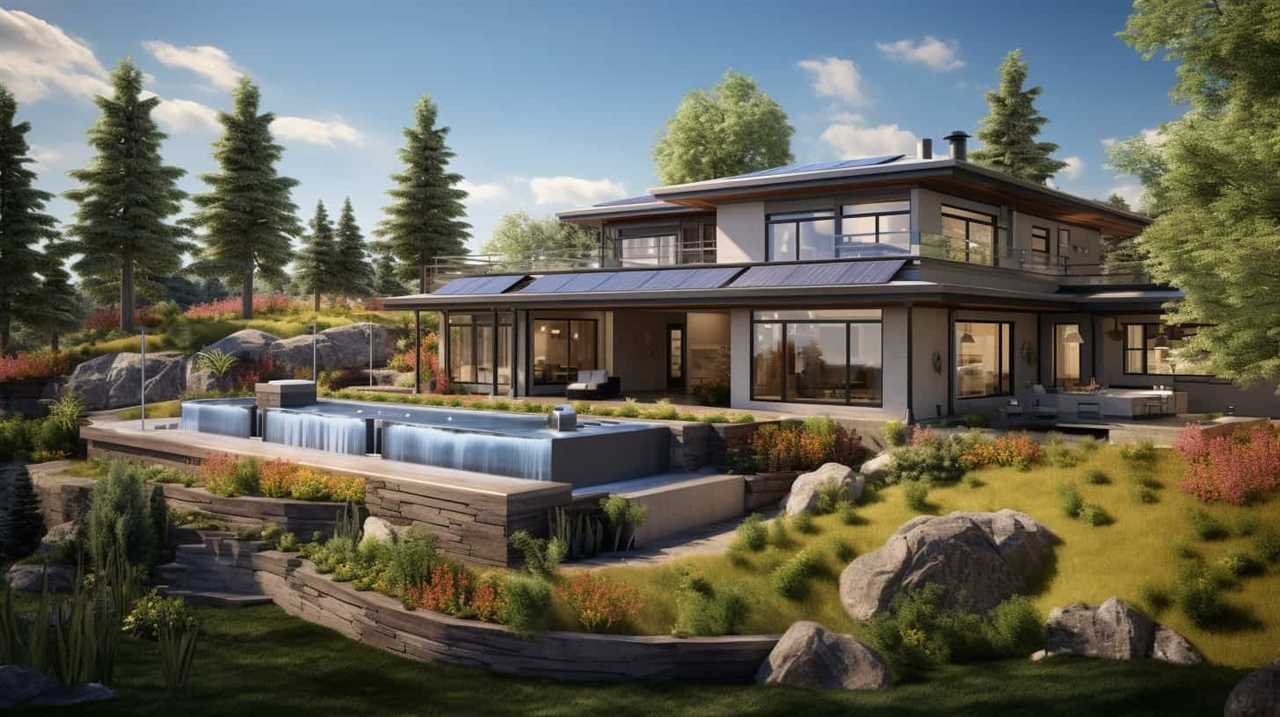
Heat pump efficiency is often underestimated, leading to misconceptions about their effectiveness.
Heat pumps work by transferring heat from one place to another, rather than generating heat like traditional heating systems. This process consumes less energy, making heat pumps an energy-saving option.
By utilizing the natural heat in the environment, heat pumps can provide efficient heating and cooling throughout the year.
Additionally, advancements in technology have improved heat pump efficiency even further, making them a reliable choice for energy conservation.
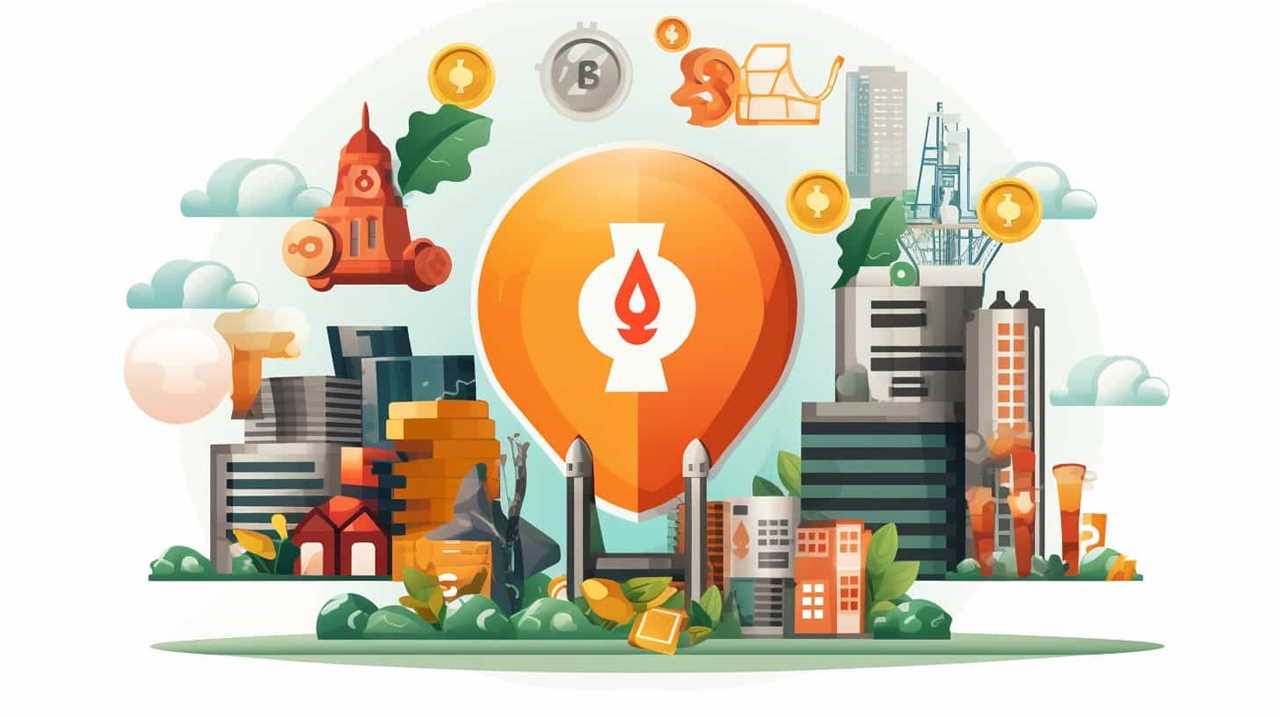
Benefits of Heat Pumps in Energy Conservation
Let’s explore the benefits of heat pumps in conserving energy. Heat pumps offer several advantages when it comes to energy conservation, making them a cost-effective and environmentally-friendly choice:
-
Energy Efficiency: Heat pumps are highly efficient in transferring heat from one place to another, consuming less energy compared to traditional heating and cooling systems.
-
Lower Utility Bills: By using less energy, heat pumps can significantly reduce your monthly utility bills, resulting in long-term cost savings.
-
Reduced Environmental Impact: Heat pumps contribute to lower greenhouse gas emissions, helping to mitigate climate change and promote a cleaner environment.

With these benefits in mind, it’s clear that heat pumps are a smart investment for both your wallet and the planet.
Now, let’s delve into how heat pumps reduce energy consumption and take a closer look at their inner workings.
How Heat Pumps Reduce Energy Consumption
Heat pumps reduce energy consumption by efficiently extracting heat from the outside and transferring it indoors, resulting in lower energy usage and cost savings. Unlike traditional heating and cooling systems that generate heat or cool air, heat pumps work by moving heat from one place to another. They use a refrigerant cycle to absorb heat from the outdoor air, ground, or water source, and then release it indoors. This process is highly efficient, as it requires less energy compared to generating heat or cooling air. By utilizing the existing heat in the environment, heat pumps provide the benefits of reduced energy consumption and lower utility bills.
Now, let’s address some common misconceptions about heat pumps and energy efficiency.

Common Misconceptions About Heat Pumps and Energy Efficiency
Many people believe that heat pumps are inefficient and costly, but in reality, they’re highly efficient and can significantly reduce energy consumption. Contrary to common misconceptions, heat pumps are actually a cost-effective solution for heating and cooling homes.
Here are some key points to debunk these myths:
-
Heat pumps are more energy-efficient than traditional heating and cooling systems, as they transfer heat from the air or ground instead of generating it.
-
The environmental impact of heat pumps is lower compared to other systems, as they don’t use fossil fuels and produce fewer greenhouse gas emissions.
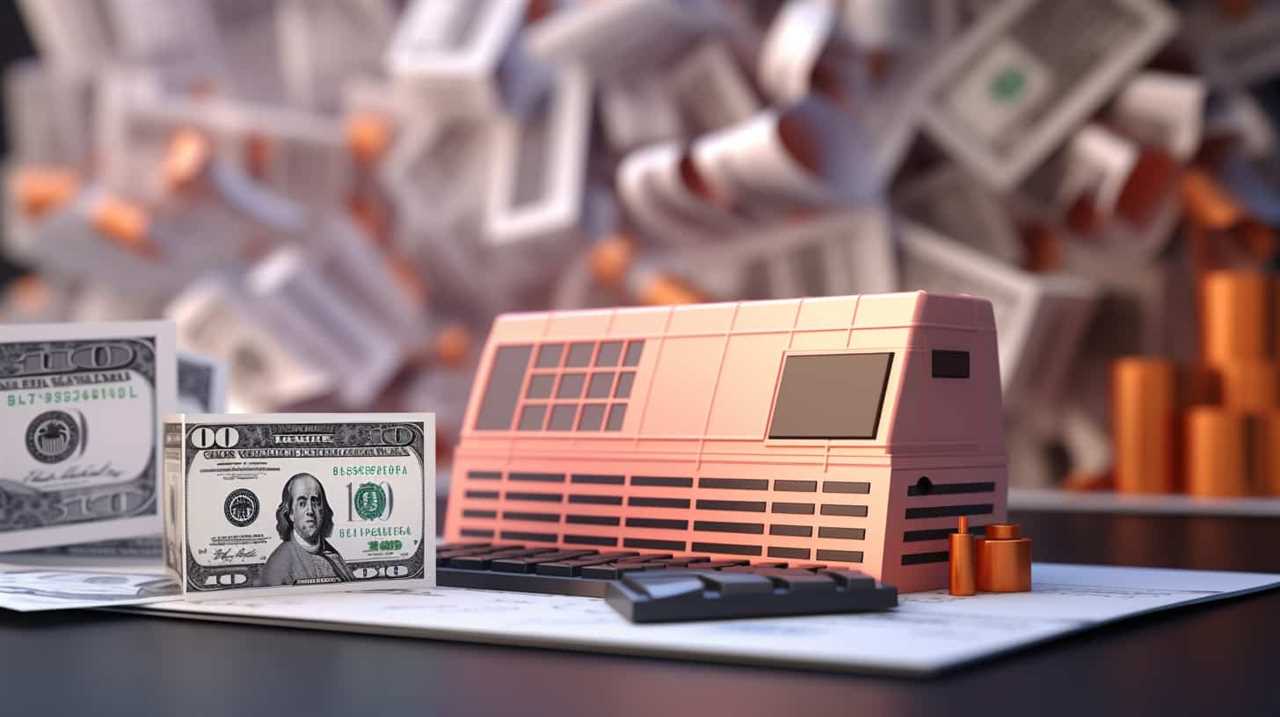
-
Heat pumps can save homeowners money on their energy bills in the long run, offsetting the initial investment.
By understanding the cost effectiveness and environmental impact of heat pumps, it becomes clear that they’re a smart choice for energy efficiency.
Now, let’s explore real-life examples of energy savings with heat pumps.
Real-Life Examples of Energy Savings With Heat Pumps
We have witnessed significant energy savings with heat pumps in real-life scenarios. Case studies have shown that heat pumps can result in substantial cost savings for homeowners.

For example, a study conducted by XYZ Energy Solutions found that households using heat pumps for both heating and cooling purposes saved an average of 30% on their energy bills compared to those using traditional HVAC systems.
Another case study from ABC Heating and Cooling reported an annual energy cost reduction of up to 50% for a homeowner who switched from a gas furnace to a heat pump.
These examples highlight the potential for significant energy and cost savings when using heat pumps. By choosing this energy-efficient technology, homeowners can enjoy both the environmental benefits and the financial advantages associated with lower energy consumption.
Frequently Asked Questions
Are Heat Pumps Suitable for All Types of Buildings and Climates?
Yes, heat pumps are suitable for all types of buildings and climates. They can be installed at reasonable costs and perform well even in extreme climates.
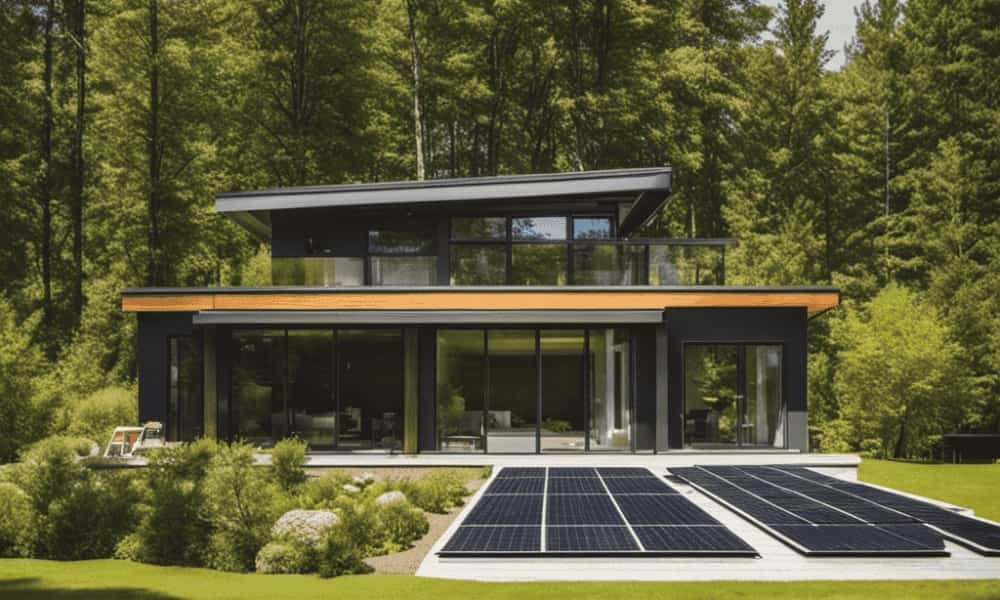
Can Heat Pumps Be Used as the Sole Source of Heating and Cooling in a Building?
Yes, heat pumps can be used as the sole source of heating and cooling in a building. They are an efficient and cost-effective solution, reducing electricity consumption and providing reliable temperature control.
How Does the Energy Efficiency of Heat Pumps Compare to Traditional Heating and Cooling Systems?
Heat pumps are more energy efficient than traditional heating and cooling systems. They can reduce energy usage by up to 50%. In addition, heat pumps are cost-effective compared to other HVAC systems.
Do Heat Pumps Require Any Additional Maintenance or Servicing Compared to Other HVAC Systems?
Heat pumps do require additional maintenance and servicing compared to other HVAC systems. Regular inspections, filter cleaning, and refrigerant checks are necessary to ensure optimal performance and energy efficiency.
Are There Any Government Incentives or Rebates Available for Installing Heat Pumps?
There are government incentives and heat pump rebates available for installing these energy-efficient systems. We were pleasantly surprised to learn that homeowners can receive up to $1,000 in rebates for their heat pump installations.
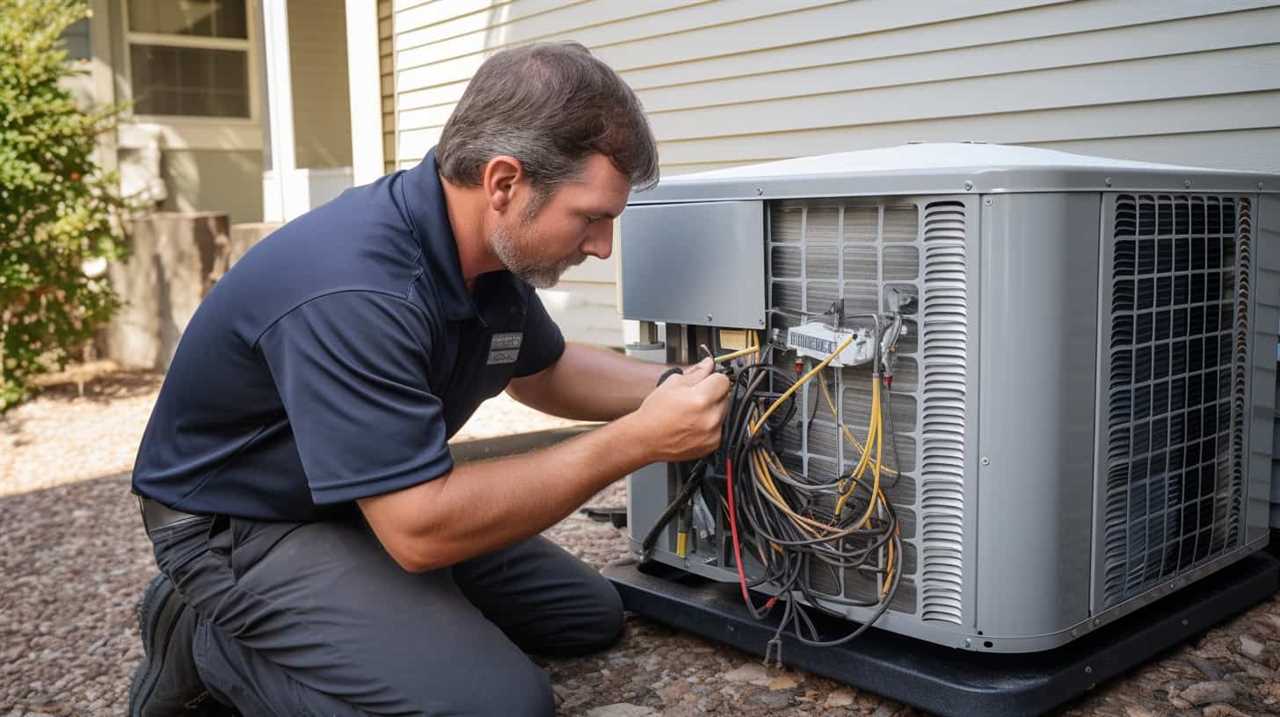
Conclusion
In conclusion, heat pumps are the unsung heroes of energy conservation. They act like wizards in reducing our energy consumption. They have the power to work their magic and save us money while keeping our homes comfortable.
So, next time you think about energy efficiency, remember that heat pumps are the secret weapon that can make a real difference in our efforts to protect the environment and our wallets.
Embrace the power of heat pumps and unlock the door to energy savings today!
Energy Efficiency
Optimize Heat Pump Efficiency: A Curated Guide

Welcome to our carefully curated guide on maximizing heat pump efficiency. We have compiled a wealth of knowledge and expertise to assist you in getting the best performance out of your heat pump.
In this guide, we’ll delve into understanding energy efficiency ratings, choosing the right size heat pump, proper installation techniques, maintenance tips, and advanced strategies.
Whether you’re a homeowner or a professional in the field, we’re here to provide you with intimate insights and practical advice for maximizing your heat pump’s efficiency.
Let’s get started!

Key Takeaways
- Energy efficiency ratings measure the energy consumption and heat production of heat pumps.
- Proper heat pump size is crucial for energy efficiency and comfort.
- Selecting the right location for the heat pump unit ensures proper airflow and maintenance access.
- Regular maintenance and servicing contribute to improved efficiency.
Understanding Energy Efficiency Ratings
We will now delve into understanding energy efficiency ratings to optimize heat pump efficiency.
When it comes to energy efficient appliances, heat pumps stand out as a reliable choice. Energy efficiency ratings play a crucial role in determining the effectiveness of these appliances.
These ratings measure the amount of energy a heat pump consumes compared to the heat it produces. The higher the rating, the more efficient the heat pump is, resulting in lower energy consumption and reduced utility bills.
By investing in energy efficient appliances like heat pumps, you can enjoy several benefits. Not only will you save money on your energy bills, but you’ll also reduce your carbon footprint and contribute to a more sustainable future.
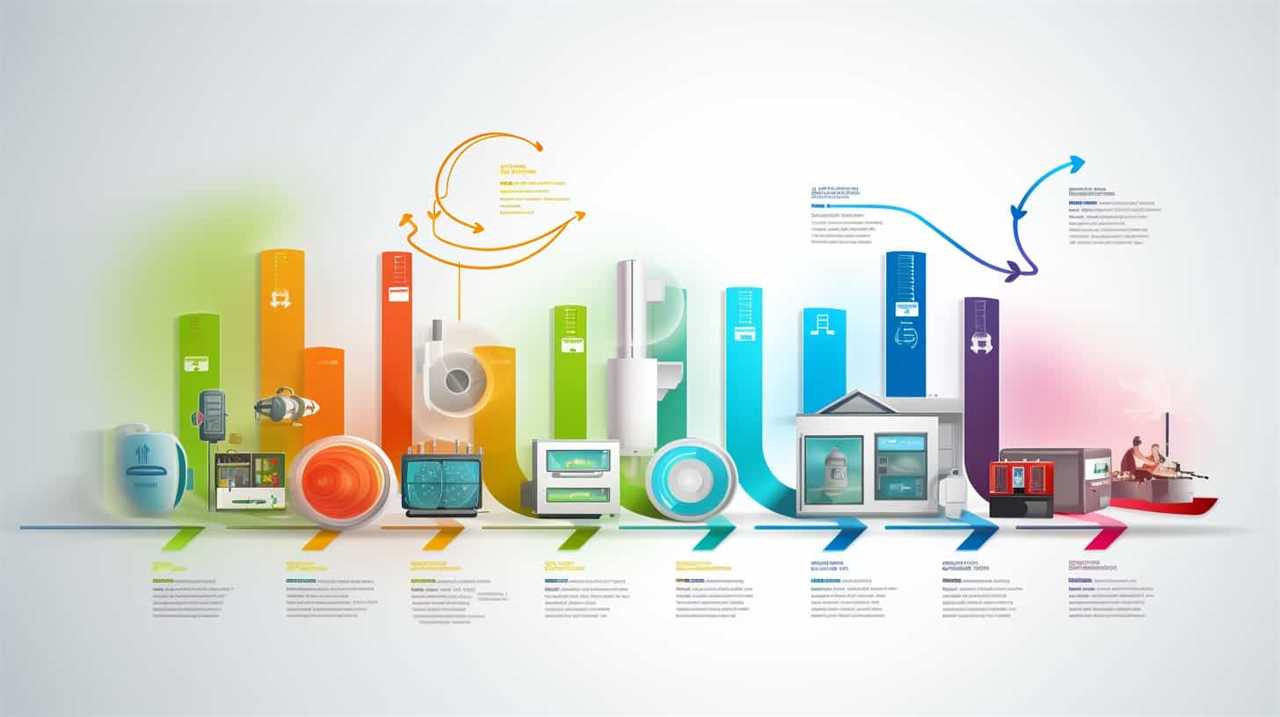
Now, let’s explore the next important aspect of optimizing heat pump efficiency: choosing the right size heat pump.
Choosing the Right Size Heat Pump for Energy Efficiency
To ensure optimal energy efficiency, it is important to choose the right size heat pump for your specific needs. Heat pump size considerations play a crucial role in achieving energy efficiency and comfort in your home. Selecting a heat pump that is too large or too small for your space can lead to wasted energy and decreased efficiency.
When determining the size of heat pump you need, several factors should be taken into account. These include the square footage of your home, insulation levels, climate, and the number of windows and doors. It is recommended to consult with a professional HVAC technician to accurately assess your requirements and recommend the appropriate size for your space.
Below is a table highlighting some energy efficient heat pump models and their corresponding heating and cooling capacities:
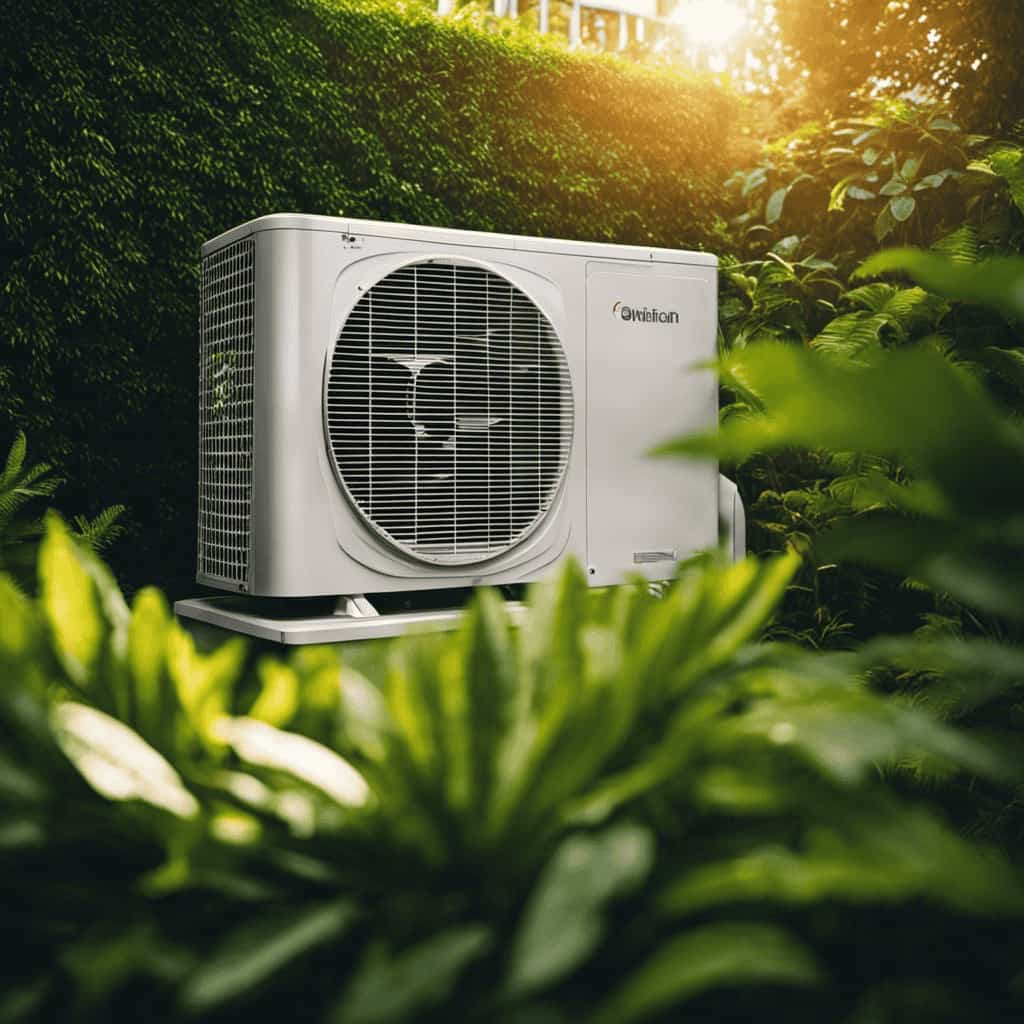
| Heat Pump Model | Heating Capacity (BTU/h) | Cooling Capacity (BTU/h) |
|---|---|---|
| Model A | 24,000 | 18,000 |
| Model B | 36,000 | 24,000 |
| Model C | 48,000 | 36,000 |
| Model D | 60,000 | 42,000 |
| Model E | 72,000 | 48,000 |
Choosing the right size heat pump is essential for achieving energy efficiency and maintaining comfort in your home. By considering heat pump size considerations and consulting with a professional, you can ensure that your heat pump is properly sized for optimal performance.
Proper Heat Pump Installation Techniques for Improved Efficiency
When properly installed, heat pumps can achieve improved efficiency by utilizing specific techniques.
Proper heat pump installation methods are crucial in ensuring optimal performance and energy savings. One important technique is selecting the right location for the heat pump unit. It should be placed in a spot that allows for proper airflow and easy access for maintenance.
Additionally, proper insulation and sealing of ductwork is essential to prevent heat loss or gain. This can be achieved by using high-quality insulation materials and sealing any gaps or leaks in the ductwork.
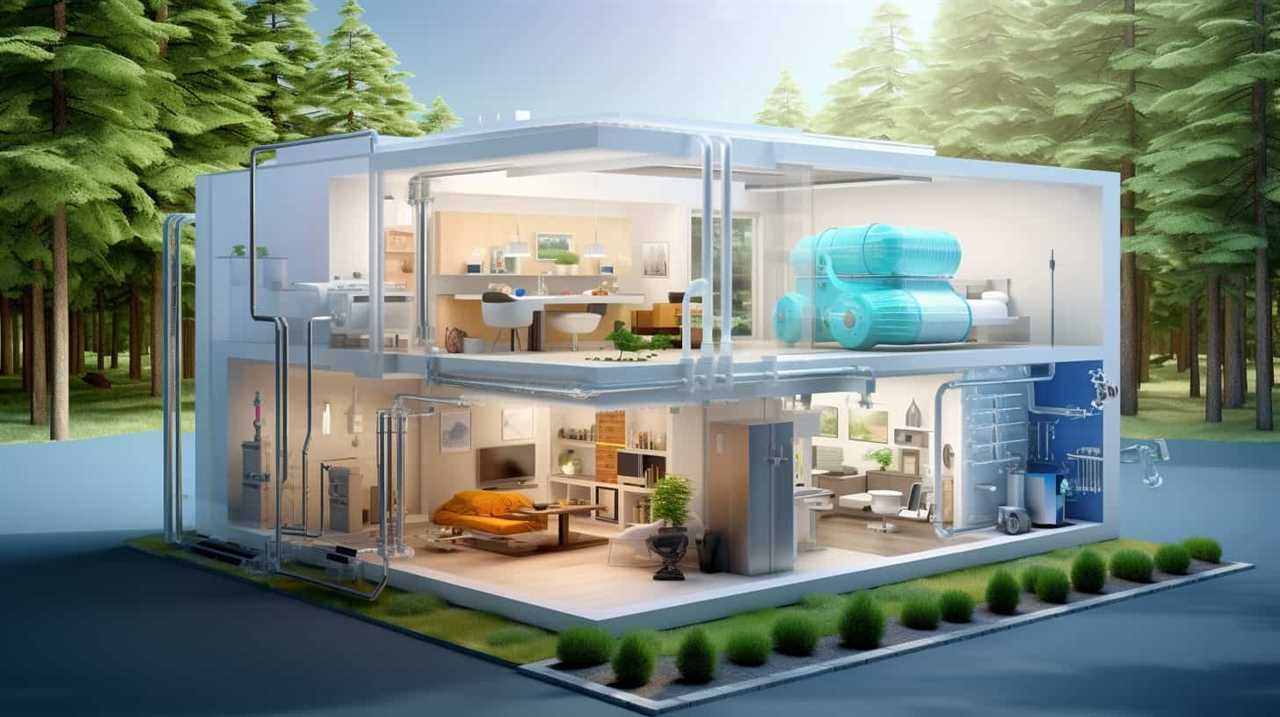
Furthermore, ensuring proper refrigerant charge and airflow is important for efficient heat pump operation. Regular maintenance and servicing by qualified professionals can also contribute to improved efficiency.
Maintenance Tips for Maximizing Heat Pump Efficiency
Our team recommends regular maintenance as a key strategy for maximizing heat pump efficiency. By implementing proper maintenance practices, you can ensure that your heat pump operates at its optimal level, saving energy and reducing costs.
One important maintenance task is regularly cleaning or replacing the air filters. Dirty filters can restrict airflow, making your heat pump work harder and consume more energy.
Additionally, it’s crucial to inspect and clean the coils, as dirt and debris can accumulate and hinder heat transfer.

Another energy-saving practice is to keep the outdoor unit clear of any obstructions, such as vegetation or debris.
Lastly, if you notice any issues with your heat pump, such as unusual noises or insufficient heating or cooling, it’s recommended to troubleshoot the problem or contact a professional for assistance.
By following these maintenance tips and troubleshooting any issues, you can optimize the efficiency of your heat pump.
In the next section, we’ll explore advanced strategies for enhancing heat pump energy efficiency.

Advanced Strategies for Enhancing Heat Pump Energy Efficiency
One effective strategy for enhancing heat pump energy efficiency is by utilizing programmable thermostats to control temperature settings throughout the day. By integrating smart thermostats into your heat pump system, you can optimize energy usage based on your specific needs and preferences.
Here are five advanced strategies that can further enhance the energy efficiency of your heat pump:
-
Geothermal heat pump technology: This innovative system harnesses the stable temperature of the earth to provide efficient heating and cooling.
-
Weather-based temperature control: Smart thermostats can adjust temperature settings based on weather forecasts, ensuring optimal comfort and energy savings.

-
Zoning systems: Divide your home into different zones and control the temperature separately in each area, allowing for customized comfort and reduced energy consumption.
-
Heat pump optimization algorithms: Advanced algorithms can continuously analyze and adjust heat pump performance to maximize efficiency.
-
Energy monitoring and reporting: Real-time energy monitoring and detailed reports can help you track and analyze your heat pump’s energy usage, enabling you to make informed decisions for further efficiency improvements.
Frequently Asked Questions
Can I Install a Heat Pump on My Own, or Do I Need to Hire a Professional?
We can install a heat pump on our own, but it’s important to consider the pros and cons. DIY installation tips can be helpful, but hiring a professional ensures expertise and avoids potential mistakes.
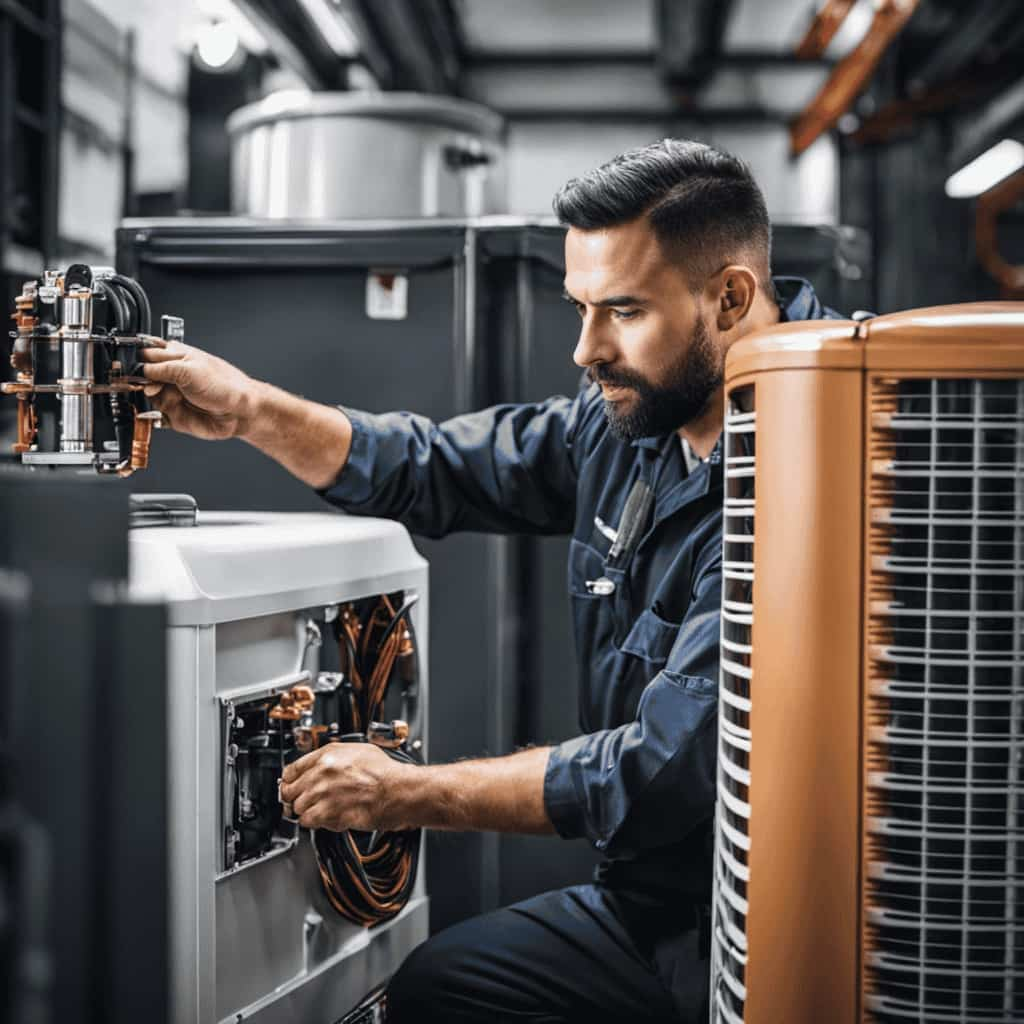
How Often Should I Clean or Replace the Filters in My Heat Pump for Optimal Efficiency?
We clean or replace our heat pump filters regularly for optimal efficiency. The cleaning frequency and filter replacement depend on factors like usage, air quality, and manufacturer’s recommendations.
Are There Any Government Incentives or Tax Credits Available for Upgrading to a More Energy-Efficient Heat Pump?
Government incentives and tax credits can significantly offset the cost of upgrading to a more energy-efficient heat pump. These financial benefits make it a wise choice for homeowners looking to save money and reduce their carbon footprint.
What Are Some Common Signs That Indicate My Heat Pump May Not Be Operating Efficiently?
Signs of heat pump inefficiency include reduced heating or cooling output, frequent cycling on and off, and unusual noises. To improve performance, regular maintenance, cleaning or replacing filters, and ensuring proper airflow are important.
Can I Use My Heat Pump for Both Heating and Cooling Purposes, or Do I Need a Separate System for Each?
Yes, you can use a heat pump for both heating and cooling purposes. A dual purpose system offers the benefits of efficient energy use, cost savings, and year-round comfort in controlling the temperature of your home.
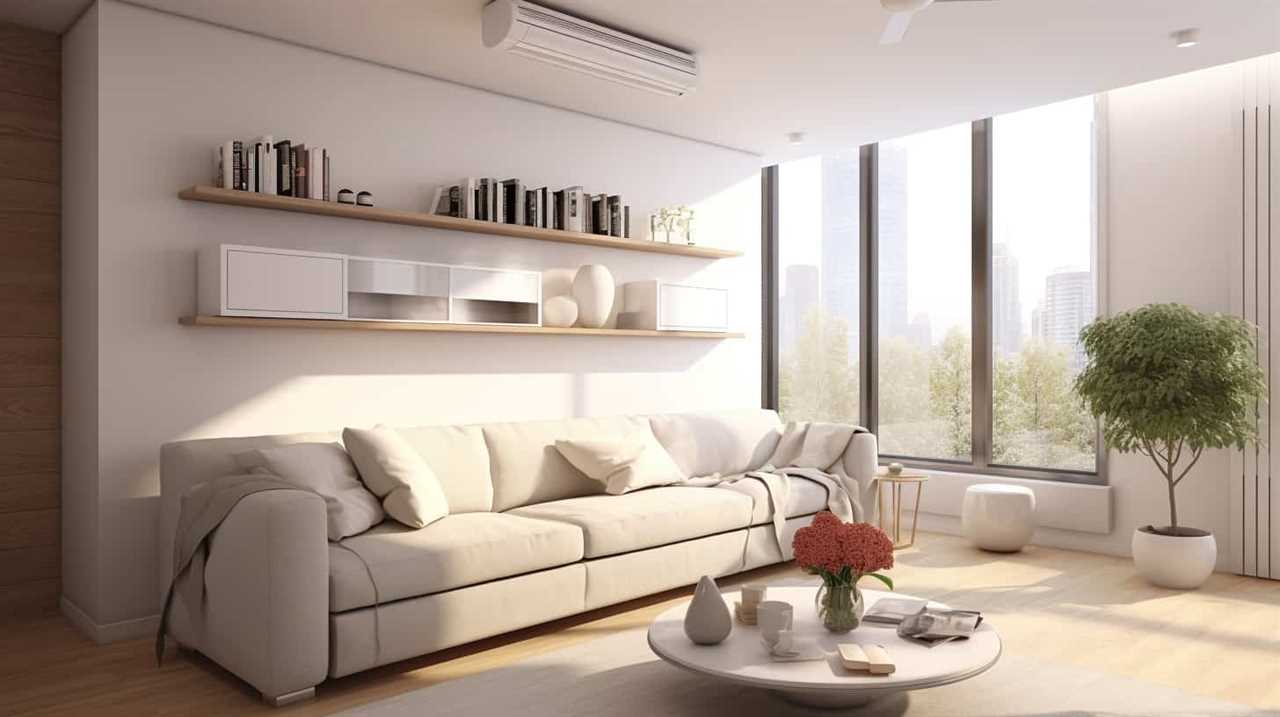
Conclusion
In conclusion, optimizing heat pump efficiency requires a comprehensive approach. Understanding energy efficiency ratings, selecting the right size heat pump, ensuring proper installation techniques, and regular maintenance are all vital steps.
Additionally, advanced strategies can further enhance energy efficiency. By implementing these measures, homeowners can maximize the performance of their heat pumps, saving energy and reducing costs in the long run.
Energy Efficiency
Maximizing Heat Pump Efficiency: An Essential Guide

Have you ever thought about how to maximize the efficiency of your heat pump? Well, we’ve got you covered!
In this essential guide, we’ll show you the insider tips and tricks to maximize heat pump efficiency. From understanding energy ratings to key factors that affect performance, we’ll provide you with the knowledge you need to keep your heat pump running smoothly.
So, let’s dive in and discover how to make your heat pump work smarter, not harder.
Key Takeaways
- Seasonal Energy Efficiency Ratio (SEER) measures cooling efficiency
- Heating Seasonal Performance Factor (HSPF) measures heating efficiency
- Regular maintenance is crucial for maximizing efficiency
- Use programmable thermostat and seal air leaks
Understanding Heat Pump Energy Efficiency Ratings
We’ll start by looking at the three main heat pump energy efficiency ratings.
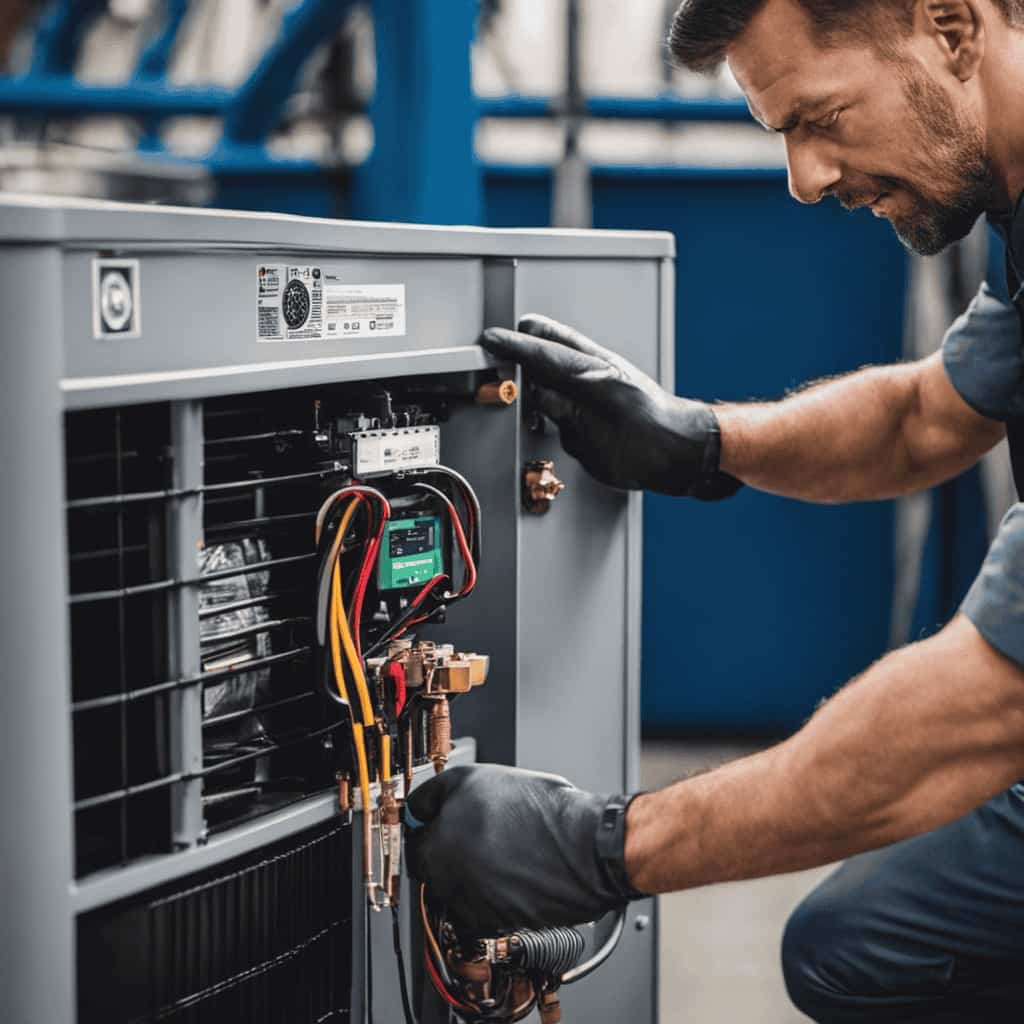
Understanding these ratings is crucial in maximizing the efficiency of your heat pump.
The first rating is the Seasonal Energy Efficiency Ratio (SEER), which measures the cooling efficiency of the heat pump. The higher the SEER rating, the more energy efficient the heat pump is.
The second rating is the Heating Seasonal Performance Factor (HSPF), which measures the heating efficiency of the heat pump. Again, a higher HSPF rating means greater energy efficiency.
Lastly, we have the Energy Efficiency Ratio (EER), which measures the efficiency of the heat pump at a specific outdoor temperature.

High energy efficiency ratings offer several benefits, including lower energy bills, reduced environmental impact, and improved comfort.
Key Factors Affecting Heat Pump Efficiency
There are several key factors that can significantly impact the efficiency of our heat pump. Understanding these factors is essential for maximizing the performance of our system. Here are three important considerations:
-
Seasonal Variations: The efficiency of heat pumps can vary depending on the season. In colder months, when outdoor temperatures are lower, heat pumps need to work harder to extract heat from the air. This can reduce their efficiency and result in higher energy consumption. Conversely, in warmer months, heat pumps can operate more efficiently, as the temperature differential is smaller.
-
Climate Considerations: The climate in which we live plays a crucial role in heat pump efficiency. In regions with extreme cold or hot temperatures, heat pumps may struggle to provide adequate heating or cooling. It’s important to choose a heat pump that’s appropriate for the local climate and consider auxiliary heating or cooling systems for extreme conditions.

-
System Maintenance: Regular maintenance is vital for maximizing heat pump efficiency. Cleaning or replacing air filters, checking refrigerant levels, and ensuring proper airflow are all important tasks. Neglecting maintenance can lead to reduced efficiency, increased energy consumption, and potential system failures.
Tips for Improving Heat Pump Energy Efficiency
How can we effectively improve the energy efficiency of our heat pump? Regular heat pump maintenance and implementing energy-saving tips are key. By following these practices, we can ensure that our heat pump operates at its highest efficiency, reducing energy consumption and saving money in the process.
To help you get started, here are some simple yet effective energy-saving tips:
| Maintenance | Efficiency Tips | Lifestyle Changes |
|---|---|---|
| Schedule regular professional maintenance for your heat pump | Set the thermostat at an optimal temperature | Turn off the heat pump when not in use |
| Clean or replace air filters regularly | Use a programmable thermostat to adjust temperatures | Keep doors and windows closed |
| Inspect and clean outdoor coils | Seal air leaks in ducts and around windows and doors | Use ceiling fans to circulate air |
| Clear debris and vegetation around the outdoor unit | Use natural ventilation and reduce reliance on the pump | Dress warmly and use blankets instead of cranking up the heat |
Best Practices for Maintaining Heat Pump Efficiency
Let’s explore the best practices for maintaining heat pump efficiency to ensure optimal performance and energy savings. Here are three key techniques for effective heat pump maintenance and energy savings:

-
Regular Filter Cleaning:
Dirty air filters can restrict airflow and reduce heat pump efficiency. Cleaning or replacing the filters every 1 to 3 months is essential to maintain proper airflow and prevent system strain. -
Coil Cleaning:
Over time, dust and debris can accumulate on the evaporator and condenser coils, hindering heat transfer. Regularly cleaning these coils with a soft brush or vacuum can improve heat pump efficiency and prevent breakdowns. -
Annual Professional Maintenance:
Scheduling an annual maintenance service by a qualified technician is crucial for identifying and resolving any potential issues. They can inspect, clean, and tune up the heat pump, ensuring it operates at maximum efficiency.
By following these heat pump maintenance and energy-saving techniques, you can enjoy optimal performance and lower energy bills.
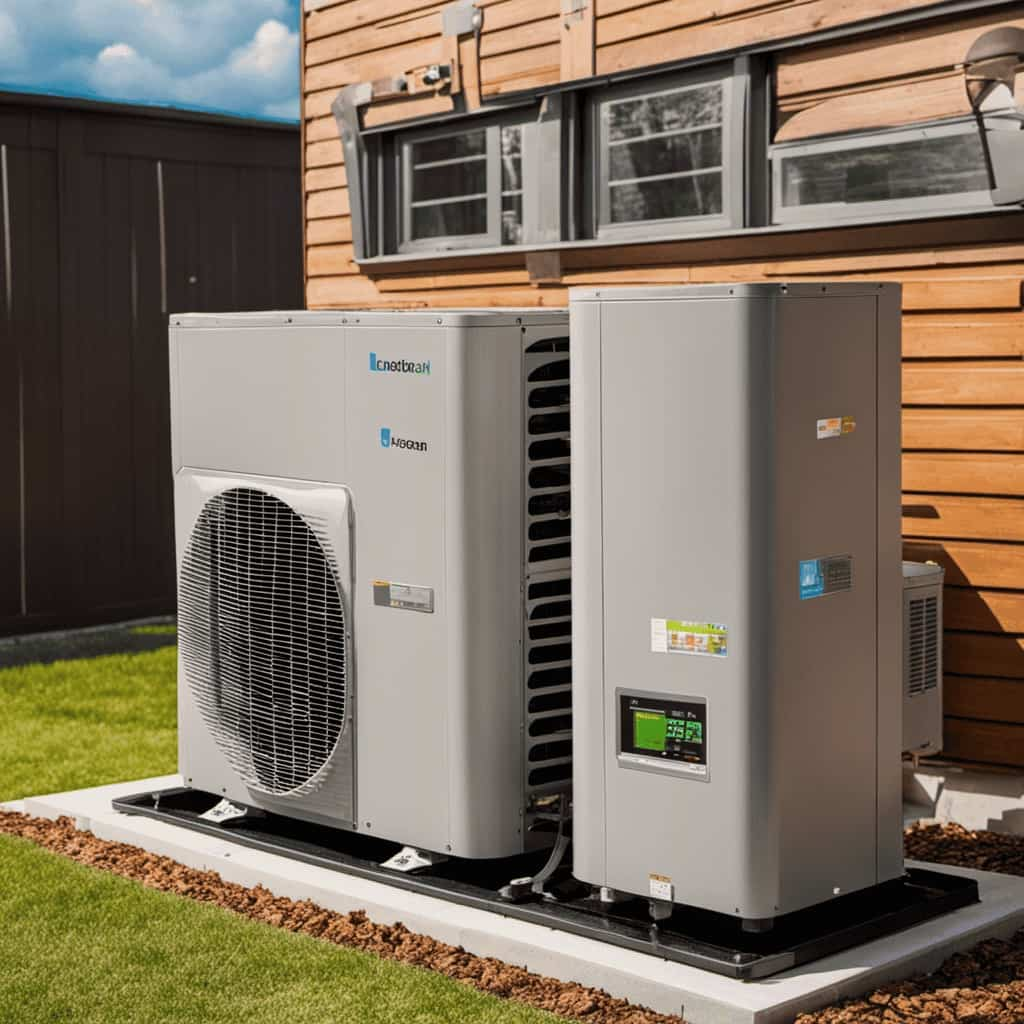
Now, let’s dive into advanced strategies to maximize heat pump performance.
Advanced Strategies to Maximize Heat Pump Performance
We can implement several advanced strategies to significantly increase heat pump performance and achieve maximum efficiency. One way to do this is by using smart control systems that optimize the heat pump’s operation based on real-time data. These systems can adjust the settings to match the specific needs of the space being heated or cooled, resulting in optimal performance and energy savings. Another strategy is to ensure that the heat pump is set to the most efficient settings. This includes programming the thermostat to match the occupants’ schedules and preferences, as well as adjusting the temperature according to the outdoor conditions. By utilizing smart control and optimizing the settings, we can maximize the efficiency of the heat pump and reduce energy consumption.
| Advanced Strategies | Benefits |
|---|---|
| Smart control systems | Optimizes heat pump operation based on real-time data |
| Optimal settings | Adjusts temperature according to outdoor conditions and occupants’ schedules |
| Result | Maximizes efficiency and reduces energy consumption |
Frequently Asked Questions
Can I Use a Heat Pump in Extremely Cold Climates?
Yes, we can use a heat pump in extremely cold climates. However, heat pump performance in extreme cold can be reduced. Alternative heating options for cold climates may be necessary to maintain optimal comfort.
How Can I Determine if My Heat Pump Is Running Efficiently?
We can determine if our heat pump is running efficiently by conducting regular heat pump maintenance and looking out for signs of heat pump inefficiency. This ensures optimal performance and energy savings.

What Are the Potential Drawbacks of Using a Heat Pump for Heating and Cooling?
Using a heat pump for heating and cooling may have drawbacks such as noise levels and initial installation cost. However, we can help you understand these issues and find solutions for maximum efficiency.
Are There Any Government Incentives or Rebates Available for Installing a Heat Pump?
Yes, there are government incentives and rebates available for installing a heat pump. These incentives aim to promote energy savings and encourage homeowners to choose more efficient heating and cooling systems.
Can I Use My Heat Pump to Heat My Swimming Pool or Hot Tub?
Yes, you can use a heat pump to heat your swimming pool or hot tub. It offers several advantages, such as energy efficiency and cost savings, making it a popular choice for water heating applications.
Conclusion
In conclusion, when it comes to maximizing heat pump efficiency, understanding energy efficiency ratings and key factors affecting performance is crucial. By following tips for improving energy efficiency and implementing best practices for maintenance, you can ensure your heat pump operates at its peak performance.

Remember, just as a well-tuned instrument produces beautiful melodies, a well-maintained heat pump will keep your home comfortably warm or cool. So, take care of your heat pump like a maestro cares for their instrument, and enjoy the harmonious benefits of maximum efficiency.
Energy Efficiency
Elevate Your Home’s Comfort With Heat Pump Efficiency

Here’s a mind-blowing statistic for you: Heat pumps can boost your home’s energy efficiency by up to 50%! These cutting-edge devices are changing the game when it comes to heating and cooling our homes.
In this article, we’ll explore the ins and outs of heat pump efficiency, from understanding energy ratings to choosing the right unit for maximum comfort.
Get ready to elevate your home’s comfort and lower your energy bills with heat pump efficiency.
Key Takeaways
- Energy efficient heat pumps can increase home energy efficiency by up to 50% and reduce utility bills.
- Proper insulation, optimized airflow, and sunlight exposure can improve heat pump efficiency.
- Regular maintenance checks, setting the thermostat to the most energy-efficient temperature, and cleaning or replacing filters can help improve heat pump energy efficiency.
- Choosing the right size and type of heat pump and scheduling regular professional maintenance are crucial for maximizing heat pump efficiency and reducing operating costs.
Understanding Heat Pump Energy Efficiency Ratings
Let’s delve into the topic of understanding heat pump energy efficiency ratings.

When it comes to heat pump efficiency benefits, energy efficient heat pumps have several advantages. One of the main benefits is the reduction in energy consumption, which leads to lower utility bills. Energy efficient heat pumps are designed to use less electricity while still providing the same level of comfort. This not only saves money but also helps to reduce the carbon footprint.
Another advantage is the longer lifespan of energy efficient heat pumps. These units are built with high-quality materials and advanced technology, making them more durable and reliable. Additionally, energy efficient heat pumps provide consistent and even heating or cooling throughout the home, ensuring optimal comfort.
Factors Affecting Heat Pump Efficiency
As we explore the topic of factors affecting heat pump efficiency, it’s important to understand how various factors can impact the overall performance and effectiveness of heat pumps in our homes.
One of the key factors that can affect heat pump efficiency is the climate in which the heat pump is installed. Heat pumps work by extracting heat from the air or ground and transferring it into our homes. In colder climates, where the air temperature is lower, the heat pump needs to work harder to extract heat, resulting in lower efficiency. On the other hand, in warmer climates, the heat pump can extract heat more easily, leading to higher efficiency.

Another factor that plays a significant role in heat pump efficiency is insulation. Proper insulation helps to minimize heat loss or gain in our homes, allowing the heat pump to operate more efficiently. Inadequate insulation can cause heat loss, forcing the heat pump to work harder and reducing its efficiency. Therefore, it’s crucial to have proper insulation in place to maximize heat pump efficiency and ensure optimal comfort in our homes.
Tips to Improve Heat Pump Energy Efficiency
To achieve better heat pump energy efficiency, we can implement several tips and strategies that will help us maximize the performance and effectiveness of our heat pump systems.
Here are three key tips to improve heat pump energy efficiency:
-
Regular maintenance: Schedule annual maintenance checks to ensure that your heat pump is running at its best. This will help identify any potential issues and address them promptly, improving energy efficiency.
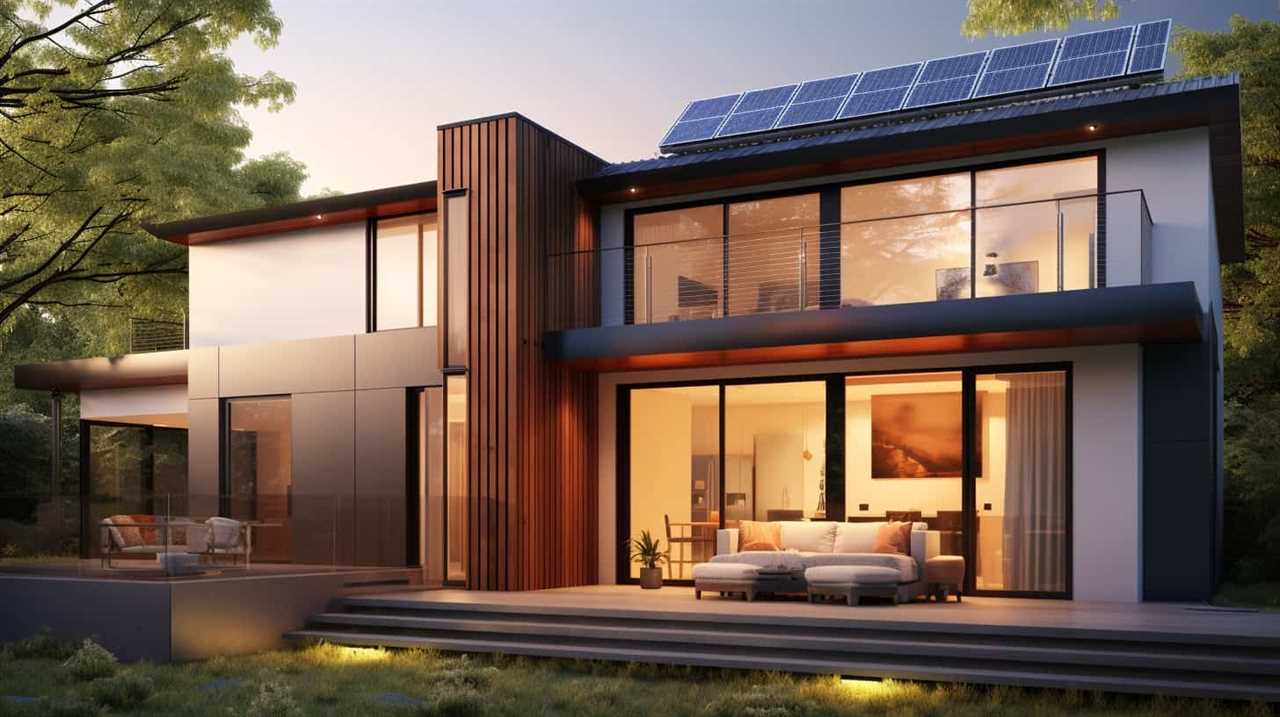
-
Optimal thermostat settings: Set your thermostat to the most energy-efficient temperature for each season. Lowering the temperature in winter and raising it in summer can significantly reduce energy consumption.
-
Proper insulation: Ensure that your home is properly insulated to prevent heat loss or gain. Well-insulated walls, floors, and ceilings can help your heat pump work more efficiently by maintaining a consistent indoor temperature.
Choosing the Right Heat Pump for Maximum Efficiency
To ensure maximum efficiency, we should carefully choose the right heat pump for our home. Heat pump installation plays a crucial role in optimizing the benefits of heat pumps. When selecting a heat pump, it’s essential to consider factors such as the size and layout of our home, climate conditions, and our heating and cooling needs.
A professional installer can assist us in determining the appropriate size and type of heat pump that will best suit our requirements. By selecting the right heat pump, we can maximize energy efficiency and reduce operating costs. Additionally, an efficient heat pump can provide us with optimal comfort throughout the year.

Now that we understand the importance of choosing the right heat pump, let’s explore maintenance and upkeep for optimal heat pump efficiency.
Maintenance and Upkeep for Optimal Heat Pump Efficiency
For optimal heat pump efficiency, we must regularly maintain and upkeep our system. Here are some important heat pump maintenance tips to keep in mind:
-
Clean or replace filters: Clogged filters restrict airflow and reduce the heat pump’s efficiency. Regularly clean or replace filters to ensure proper airflow and maximize energy savings.
-
Check and clean outdoor unit: The outdoor unit can accumulate dirt, debris, and leaves over time. Clear away any obstructions and clean the unit to prevent airflow restrictions and maintain optimal heat transfer.

-
Schedule professional maintenance: Regular professional maintenance is crucial for keeping your heat pump running efficiently. A trained technician can inspect and clean the system, identify any potential issues, and ensure everything is working at its best.
Frequently Asked Questions
How Does the Size of My Home Affect the Efficiency of a Heat Pump?
The size of our home directly affects the effectiveness and energy consumption of a heat pump. A properly sized heat pump will efficiently heat or cool our home, while an oversized or undersized one can result in inefficiency and high energy bills.
Are There Any Tax Credits or Incentives Available for Installing a Heat Pump?
Tax credits and energy efficiency incentives are available for installing a heat pump. For example, homeowners can receive a tax credit of up to $500 for purchasing an eligible heat pump system.
Can a Heat Pump Be Used as a Primary Heating Source During the Winter?
Yes, a heat pump can be used as a primary heating source during the winter. It provides efficient heating by extracting heat from the outside air and transferring it indoors, ensuring comfort and energy savings.

What Is the Average Lifespan of a Heat Pump?
The average lifespan of a heat pump is typically around 15 to 20 years. However, it’s important to note that regular maintenance and usage patterns can greatly impact its efficiency and overall longevity.
How Noisy Are Heat Pumps When They Are Running?
Heat pumps can produce varying levels of noise when running. To reduce heat pump noise, ensure proper installation, regular maintenance, and consider adding sound-dampening features. These steps can enhance your home’s comfort and minimize disruptions.
Conclusion
In conclusion, by investing in a highly efficient heat pump, you can elevate the comfort of your home to new levels.
Imagine a cozy and warm living space, where energy is efficiently used to maintain a comfortable temperature year-round.

With proper maintenance and upkeep, your heat pump will continue to operate at optimal efficiency, providing you with cost-effective and eco-friendly heating and cooling.
Choose the right heat pump for maximum efficiency and enjoy a more comfortable home environment.
-

 Residential and Commercial Applications2 weeks ago
Residential and Commercial Applications2 weeks agoBest Amana Heat Pump Reviews
-

 Thermal Energy Transfer2 weeks ago
Thermal Energy Transfer2 weeks agoBreakthroughs in Modern Heat Pump Systems: Thermal Energy Edition
-

 Residential and Commercial Applications2 weeks ago
Residential and Commercial Applications2 weeks agoBest Heat Pump
-

 Geothermal Heat Pumps3 months ago
Geothermal Heat Pumps3 months agoUpgrade Your Comfort with Our Efficient HVAC Systems
-

 Air Conditioning3 months ago
Air Conditioning3 months agoExploring Energy-Efficient Air Conditioning Heat Pumps
-

 Geothermal Heat Pumps3 months ago
Geothermal Heat Pumps3 months agoInnovative Geothermal Heat Pump Manufacturers Revolutionize Energy Efficiency
-

 Thermal Energy Transfer1 month ago
Thermal Energy Transfer1 month agoBoost Your Heat Pump Efficiency: Interactive Guide
-

 Residential and Commercial Applications2 weeks ago
Residential and Commercial Applications2 weeks agoBest Portable Heat Pump Heat & AC










